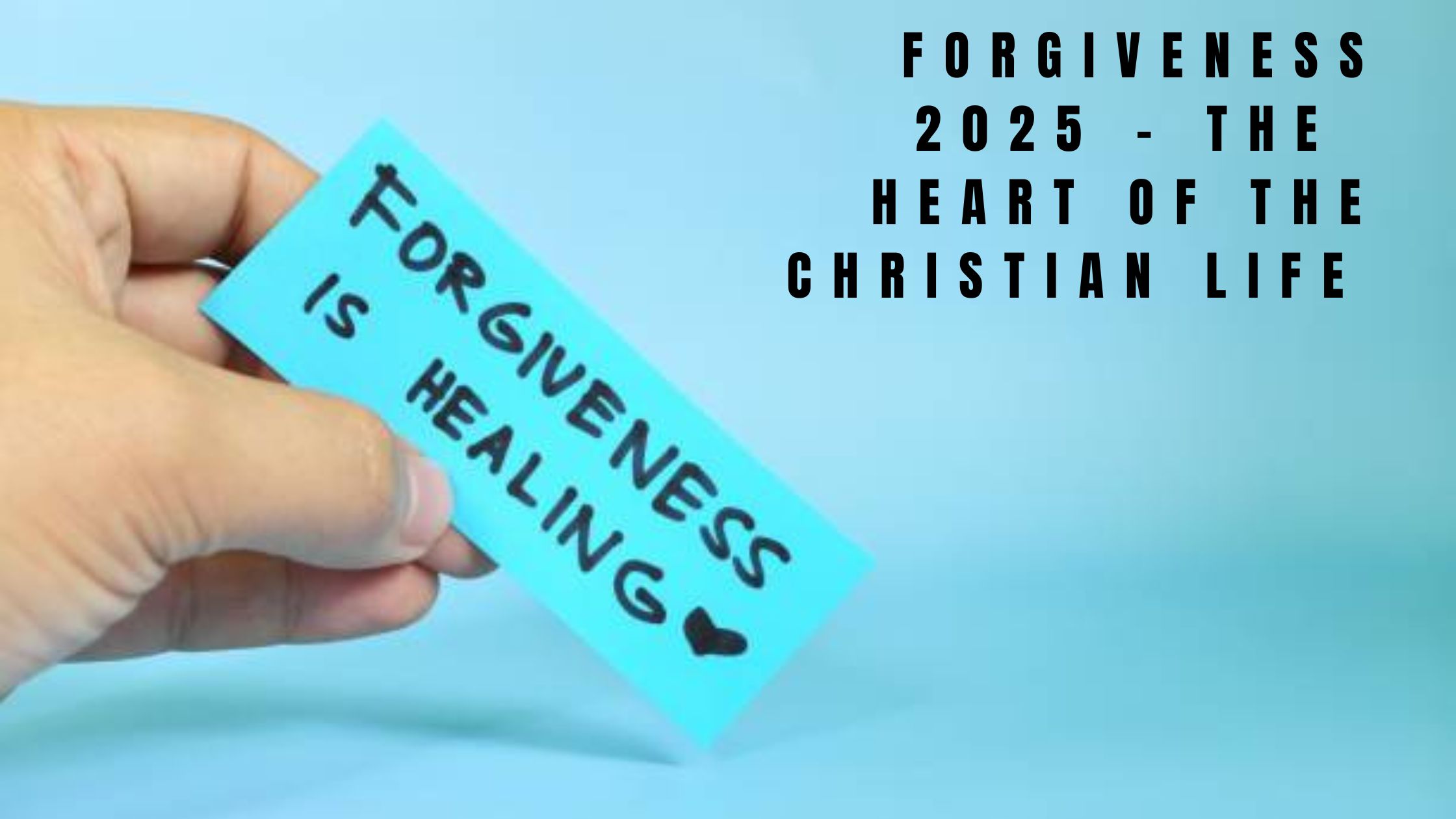Key Verse: Ephesians 4:32 – “Be kind and compassionate to one another, forgiving one another, just as God in Christ forgave you.”
Introduction
Forgiveness 2025 – The Heart of the Christian Life

• Forgiveness is one of the deepest and most essential truths in the Bible.
• It is human nature to hold onto insults and hurts, but it is God’s nature to forgive.
• Without forgiveness we are not reconciled to God or people.
• The entire work of Jesus Christ on the cross was based on forgiveness.
Greek word: Aphiēmi (ἀφίημι) – “to let go, to release.”
Hebrew word: Salah (סָלַח) – “to remove sin, to forgive.”
1. Why is forgiveness needed?
(a) For reconciliation with God
• Isaiah 59:2 – “Your iniquity has separated you from God.”
• Only forgiveness restores us to Him.
(b) For reconciliation with others
• Matthew 6:12 – “Forgive us our trespasses, as we also forgive those who trespass against us.”
• If we do not forgive, our relationships will remain broken.
(c) For spiritual freedom
• Hebrews 12:15 – Bitterness destroys spiritual life.
• Forgiveness brings peace and freedom..
2. The consequences of not forgiving
1. Broken Relationship with God
- Matthew 6:14–15 – “For if you forgive other people when they sin against you, your heavenly Father will also forgive you. But if you do not forgive others their sins, your Father will not forgive your sins.”
➝ When we refuse to forgive, we close the channel of God’s forgiveness toward us. - Mark 11:25 – “And when you stand praying, if you hold anything against anyone, forgive them, so that your Father in heaven may forgive you your sins.”
➝ Unforgiveness blocks our prayers and fellowship with God.
2. Bitterness and Emotional Bondage
- Hebrews 12:15 – “See to it that no bitter root grows up to cause trouble and defile many.”
➝ Unforgiveness leads to bitterness, resentment, and spiritual decay. - It keeps us chained to the past, reliving pain instead of walking in freedom.
3. Destroyed Relationships
- Unforgiveness erodes trust, love, and unity in families, friendships, and churches.
- Ephesians 4:31–32 urges us to put away bitterness, anger, and wrath, replacing them with kindness and forgiveness.
➝ When we hold grudges, relationships die slowly.
4. Physical and Mental Health Consequences
- Medical studies show that bitterness and unforgiveness can increase stress, anxiety, high blood pressure, and even weaken the immune system.
- People who forgive experience greater peace and emotional stability.
5. Loss of Spiritual Growth and Joy
- Matthew 18:23–35 – Parable of the Unforgiving servant
➝ The unforgiving servant was handed over to the tormentors until he repaid his debt. This illustrates how refusing to forgive leads to torment—spiritually and emotionally. - When we don’t forgive, we block God’s blessings and grieve the Holy Spirit (Ephesians 4:30–32).
6. Unforgiveness Keeps Us in Hypocrisy
- We ask God daily for mercy, but when we refuse to give it to others, we become like the servant in Matthew 18.
- Jesus calls this hypocrisy and warns that God will deal with us in the same way.
7. Eternal Consequences
- Matthew 18:35 – “This is how my heavenly Father will treat each of you unless you forgive your brother or sister from your heart.”
➝ Persistent unforgiveness is evidence of an unchanged heart. Those who refuse forgiveness show they have not truly grasped or received God’s mercy.
3. Examples of forgiveness in the Bible

1. Joseph – forgave his brothers (Genesis 45:5).
2. David – forgave Saul several times (1 Samuel 24:10-11).
3. Jesus – said on the cross: “Father, forgive them” (Luke 23:34).
4. Stephen – forgave the stone-pelters (Acts 7:60).
4. Jesus’ teaching – unlimited forgiveness
1. Key Scripture References
- Matthew 18:21–22 – Peter came to Him and asked, “Lord, how many times shall I forgive my brother or sister who sins against me? Up to seven times?” Jesus answered, “I tell you, not seven times, but seventy-seven times” (or seventy times seven).
- Matthew 6:14–15 – For if you forgive others their trespasses, your heavenly Father will also forgive you, but if you do not forgive others, neither will your Father forgive your trespasses.
- Luke 23:34 – Jesus said, “Father, forgive them, for they do not know what they are doing.”
2. The Radical Nature of Unlimited Forgiveness
- In Jewish tradition, forgiving three times was considered generous (based on Amos 1:3–6). Peter thought he was being extra gracious suggesting “seven times.”
- Jesus shattered human limits by saying seventy times seven (a symbolic way of saying “without limit”).
- Forgiveness is not about keeping count, but about cultivating a forgiving heart.
3. Why Unlimited Forgiveness Matters
- It reflects God’s character: God continually forgives us (Psalm 103:12; 1 John 1:9).
- It breaks cycles of revenge: Instead of hatred escalating, forgiveness ends the chain of retaliation (Romans 12:17–21).
- It heals the forgiver: Carrying grudges poisons our own hearts; forgiveness sets us free emotionally and spiritually.
4. Illustrations from Jesus’ Teaching
- Parable of the Unforgiving Servant (Matthew 18:23–35):
A servant forgiven an unpayable debt refuses to forgive a small debt from another. Jesus shows that God expects us to extend the same mercy He has given us. - The Cross: Jesus forgave His executioners. This is the ultimate demonstration of limitless forgiveness.
5. Practical Application for Believers
• Pray for those who wrong you (Matthew 5:44)
Jesus commands us to “love your enemies and pray for those who persecute you.” Prayer is the first step toward forgiveness. When we pray for someone who hurt us, our heart begins to soften, and we start seeing them as God sees them — broken people in need of grace.
• Let go daily: Make forgiveness a habit, not a rare act
Forgiveness is not a one-time event but a daily choice. Offenses can pile up if we don’t deal with them regularly. Paul reminds us in Colossians 3:13 to “bear with each other and forgive one another if any of you has a grievance.” Treat forgiveness like spiritual housekeeping — clear out resentment before it builds into bitterness.
• Distinguish forgiveness from reconciliation
Forgiveness is releasing the debt in your heart before God. Reconciliation, however, requires mutual repentance, rebuilding of trust, and safety. For example:
- You may forgive an abuser, but that doesn’t mean you must allow continued harm.
- Forgiveness is unconditional; reconciliation is conditional.
This distinction frees believers from the pressure of returning to toxic or dangerous relationships while still obeying Christ’s call to forgive.
• Rely on God’s grace (Ephesians 4:32)
Some wounds feel too deep to forgive by our own strength. That’s why Paul says: “Be kind and compassionate to one another, forgiving each other, just as in Christ God forgave you.” We forgive, not because the other person deserves it, but because God’s Spirit empowers us to reflect Christ’s mercy. Forgiveness is supernatural — it flows from the cross, not from human willpower.
. Modern Relevance
- In families: forgiving repeated mistakes.
- In communities: breaking cycles of hatred, prejudice, and revenge.
- In personal life: releasing bitterness from betrayal or hurt.
6. Benefits of Forgiveness

01. Grace of God – Matthew 6:14
“For if you forgive others their trespasses, your heavenly Father will also forgive you.”
- When we forgive, we experience the flow of God’s grace in our own lives.
- Forgiveness keeps the channel open between us and God, ensuring that His mercy continually covers our failures.
- Unforgiveness blocks grace, but forgiveness welcomes God’s favor and blessing.
2. Peace of Heart – Psalm 32:1
“Blessed is the one whose transgressions are forgiven, whose sins are covered.”
- When we forgive, we release the burden of resentment and bitterness.
- Peace replaces anger, and joy takes the place of sorrow.
- Just as we feel blessed when God forgives us, extending forgiveness brings inner healing and emotional rest.
3. Reconciliation and Restoration – Genesis 50:19–21
Joseph, after being betrayed by his brothers, said: “Don’t be afraid… You intended to harm me, but God intended it for good… I will provide for you and your children.”
- Forgiveness opens the door for broken relationships to be healed.
- Joseph’s forgiveness restored unity in his family and saved many lives.
- In the same way, forgiveness can transform broken families, friendships, and communities into places of love and healing.
4. Spiritual Growth – Colossians 3:13
“Bear with each other and forgive one another… Forgive as the Lord forgave you.”
- Forgiveness strengthens our spiritual maturity, teaching us to walk in humility and love.
- It shapes us into Christ’s likeness, helping us to reflect His compassion.
- Every act of forgiveness deepens our dependence on God and helps us grow in grace.
✨ Summary:
The benefits of forgiveness are not just for the one being forgiven — they are even more for the one forgiving. Forgiveness brings God’s grace, inner peace, restored relationships, and spiritual growth. It is one of the most Christlike actions a believer can take.
7. Practical Steps to Forgive
1. Acknowledge the Hurt
- Forgiveness doesn’t mean pretending nothing happened. Be honest before God about the pain.
- Psalm 34:18 – “The Lord is close to the brokenhearted and saves those who are crushed in spirit.”
2. Remember God’s Forgiveness Toward You
- Reflect on how much God has forgiven you through Christ.
- Ephesians 4:32 – “Forgive one another, as God in Christ forgave you.”
- When we realize the size of our own forgiven debt, it becomes easier to release others.
3. Pray for Strength to Forgive
- Forgiveness is not natural; it is supernatural.
- Ask God to change your heart and empower you by His Spirit.
- Philippians 4:13 – “I can do all this through him who gives me strength.”
4. Make the Decision to Forgive
- Forgiveness is a choice, not a feeling. You may not feel like forgiving, but obedience comes first, feelings follow later.
- Colossians 3:13 – “Bear with each other and forgive one another… forgive as the Lord forgave you.”
5. Release the Offender to God
- Let go of the desire for revenge or repayment. Trust God to be the judge.
- Romans 12:19 – “Do not take revenge… It is mine to avenge; I will repay, says the Lord.”
6. Bless and Pray for the Person
- Jesus commanded us to love our enemies and pray for them. (Matthew 5:44)
- Speaking blessing instead of cursing helps heal our heart and aligns us with Christ’s spirit.
7. Walk in Forgiveness Daily
- Old wounds may resurface. Each time, re-affirm your decision to forgive.
- Forgiveness is a process — sometimes daily, sometimes even moment by moment.
- Matthew 18:22 – Jesus told Peter to forgive “seventy times seven.”
Forgiveness is not easy, but it is possible — and it sets us free. By acknowledging the hurt, remembering God’s grace, praying, choosing, releasing, blessing, and walking in forgiveness daily, believers reflect the very heart of Jesus.
8. Life Application
• If you have bitterness in your heart against someone, cast it at the Lord’s feet today
- Bitterness is a heavy chain that weighs down the heart and hinders prayer.
- 1 Peter 5:7 – “Cast all your anxiety on him because he cares for you.”
- Take the hurt, anger, and resentment and surrender it fully to Christ. He is able to carry what you cannot.
• Forgiveness not only frees the other person, it also frees you from spiritual captivity
- Unforgiveness holds you prisoner more than the offender.
- John 8:36 – “So if the Son sets you free, you will be free indeed.”
- The moment you forgive, the chains of anger, bitterness, and revenge begin to fall off your life.
• There will be peace in the church and family only when we forgive
- Unforgiveness causes division, coldness, and strife.
- Colossians 3:14–15 – “And over all these virtues put on love, which binds them all together in perfect unity. Let the peace of Christ rule in your hearts, since as members of one body you were called to peace.”
- When we forgive each other, homes are healed, churches grow in unity, and God’s peace becomes real in our midst.
✨ Final Thought:
Forgiveness is not an optional part of the Christian life — it is the very evidence that we belong to Christ. If you carry bitterness, lay it down at the cross today. Forgive as Christ forgave you, and you will walk in freedom, joy, and peace.
Conclusion
• Forgiveness is the heart of the Christian life.
• God forgave us in Christ, so we must forgive.
• The one who forgives is truly a disciple of Christ.
Ephesians 4:32 – “Be kind and compassionate to one another, forgiving one another, as God in Christ forgave you.”
✝️ Closing Prayer Suggestion:
“Lord, you have forgiven us all our sins. Give us the strength to forgive our brothers and sisters. Remove bitterness from our hearts and make us merciful like you. Amen.”

